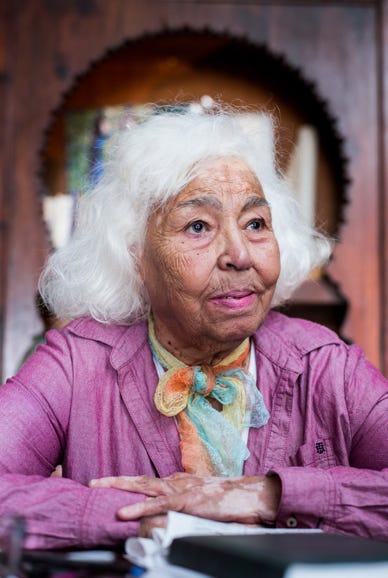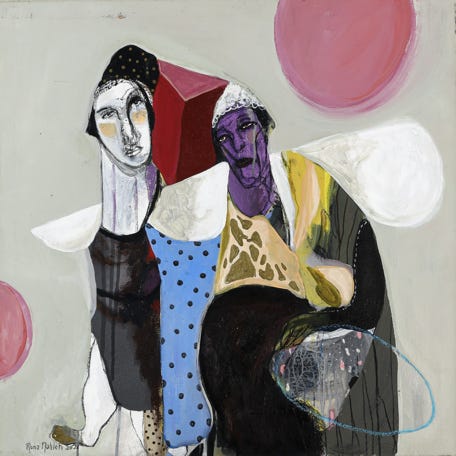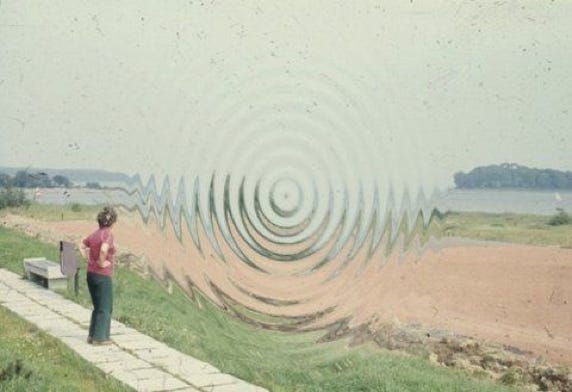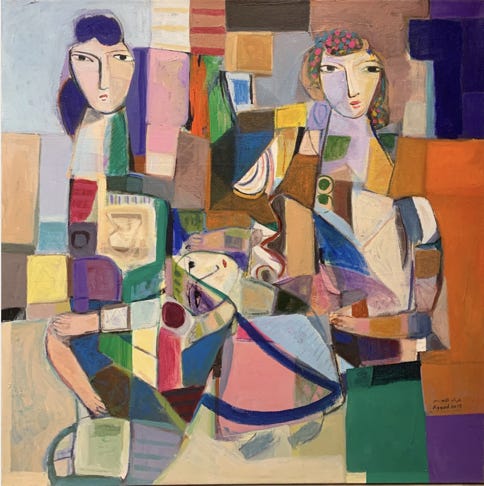No Rest for the Unawakened
Rereading Nawal El Saadawi at 29 in Brooklyn
For the truth is always easy and simple. And in its simplicity lies a savage power.
—Nawal El Saadawi, Woman at Point Zero
Life is relentless in its demand that we shed our illusions and see the truth. But sometimes, this demand is delivered with such softness that we miss it. This is why it can take a lifetime to grasp reality, even as it continually unfolds right before our eyes.
: “Reality is shy—it only reveals itself to those who do not wish it to be something else.” Shy, yes, but persistent all the same. Life does not allow us to rest until we’ve experienced the number of awakenings required for us to truly live (and only then will we be ready to die).This is, at least, what I came to understand from my third read of Nawal El Saadawi’s 1975 novel Woman at Point Zero, in which a prostitute named Firdaus tells the story of her life hours before she is executed for killing an abusive pimp, a fate she is prepared to embrace.
Her life is short and brutal but rich with transformation, offering lessons to every woman—sex worker or not. Indeed, according to Firdaus, every woman is a prostitute in one way or another, whether it’s for a job, a husband, or the streets.
“I knew that my profession had been invented by men, and that men were in control of both our worlds, the one on earth, and the one in heaven. That men force women to sell their bodies at a price, and that the lowest paid body is that of a wife. All women are prostitutes of one kind or another.”
I first encountered Woman at Point Zero as assigned high school reading in 2013 and immediately knew it would be one of the most important books I’d read in my life. I admired Nawal El Saadawi for the fearlessness with which she fought for the humanization of Arab women in her writing, medical practice, and political activism. Patriarchy and female oppression were prominent themes in her works, but they were not abstract for me—I was intimately familiar with them.
In a way, her novel was key to my first awakening. I recall being so moved by the claim that all women were prostitutes that I even disavowed marriage in an attempt to end the cycle of abuse that pervaded my lineage. Four years later, I reread the novel for a class on women’s sexuality and gender in the Middle East and doubled down on my beliefs.

But the thing about an awakening is that it’s merely one step in the evolution of our selfhood. Firdaus grapples with a series of awakenings, each more disorienting and simultaneously clarifying than the last.
In her first major awakening—this happens after moving from her quiet, rural hometown to the busy streets of Cairo—Firdaus feels as though she is looking out through her eyes “for the first time, as though I had just come into the world, or was being born a second time.”
Years later, when she temporarily escapes her abusive home, she again feels like she is seeing the streets for the first time: “A new world was opening up in front of my eyes, a world which for me had not existed before.” Bewildered, she wonders, “How was it that I had been blind to its existence all these years?”
Firdaus experiences nearly a dozen awakenings afterward, and we start to wonder: Wait, didn’t I just read this? Hasn’t this happened already? It turns out we did, and it has. In one awakening: “It was as if he had lifted a veil from my eyes, and I was seeing for the first time.” Later: “The veil was torn from my eyes. I was opening them for the first time, seeing my life in a new way.” Later, still: “[I] tore off the veil, the last, remaining veil from before my eyes.”
In fact, entire scenes are repeated throughout her life, almost verbatim. The story is repetitive and starts to feel like a fever dream. I often feel this way about life as well: forced through the same experience multiple times to see if I’ve truly learned my lesson, truly transformed, truly awakened. Same situation, different person. Same person, different name. What will I do this time?
Like Firdaus, I have had pleasant awakenings (“I walked down the street, my head held high to the heavens, with the pride of having destroyed all masks to reveal what is hidden behind”), contradictory ones (“I realized I was not nearly as free as I had hitherto imagined myself to be”), and downright brutal ones (“I had never experienced suffering such as this, never felt a deeper pain”). The ones that fall in the last camp have a way of making one feel betrayed by one’s former self.
“How many were the years of my life that went by before my body, and my self became really mine, to do with them as I wished? How many were the years of my life that were lost before I tore my body and my self away from the people who held me in their grasp since the very first day?”
This is what I’ve been experiencing over the past six months—a reorientation of my life following an intense awakening that has called into question almost every previous one I’ve ever had. (This is not unusual for someone who is twenty-nine years old, but it feels lonely nonetheless.)
Times like this force us to reexamine everything that has shaped us in the past: beliefs, habits, relationships, and even our various beloved media. I knew I had to revisit the novel I cherished the most, but I was nervous. What if, all this time, it had shaped me the wrong way? Many of my worldviews had changed since I last read Woman at Point Zero—I was more hopeful about marriage and less pessimistic about women’s status, for instance. Did that mean I wouldn’t love it anymore?
Far from it. When I reread the novel for the first time in more than seven years, I felt like I was reconnecting with an old friend—one with whom my relationship had changed, but not my affection or comfort. That old friend, it seemed, was my past self.
I was in a silent dialogue with this prior version of me, gently renegotiating many of the beliefs she held because of this novel. The process was unexpectedly therapeutic. I began to understand, viscerally, the beauty that comes with the pain of transformation. But, like Firdaus, this most certainly won’t be the last veil lifted from my eyes. I’ll be jolted by life again, thinking back to this moment and wondering how I could have been so blind all this time.
Perhaps then, I’ll reread Woman at Point Zero to continue the conversation I started with myself back in 2013. In her whimsical way, Firdaus reminds readers to remain hopeful in the face of such change, and what power lies in that flexibility: “Can the Nile, and the sky, and the trees change? I had changed, so why not the Nile and the color of the trees?”







This is a beautiful reflection 🩵
Do you feel like these repeated awakenings are all sharply defined, specific incidents that seem important even at the time, that perhaps then unfold further?
It's interesting, I feel like I've only ever had a sense that an event was impactful in retrospect - some crack in the armor appears, I become hungry for knowledge and experience relating to the crack, and slowly shift who I am over the next months and often years. Only recently did I have a very sharp, impactful incident that felt important, and it also took a month or two to become clear how important it would be. Maybe I'm lucky in this way, that I get to experience change gradually.